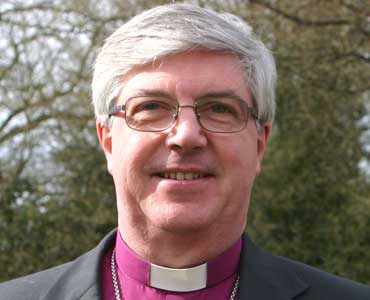Big Society needs church says Norwich Bishop
 By Keith Morris
By Keith Morris
The social landscape of
Norwich and
Norfolk would be changed immediately and much of society would begin to unravel if Christians were removed from the picture, the
Bishop of Norwich asserted at a
Norwich Diocesan Synod speech about the Big Society last weekend (March 12).
During the speech at St Luke’s Church Centre on Aylsham Road in New Catton, the Rt Rev Graham James spoke of the importance of the church in society.
“It has often been said that the Church is already engaged in making the Big Society. So it is. Remove the Christians from Norwich, Norfolk and those parts of Suffolk in our diocese, and the social landscape would be changed immediately.
“It is not just the places of worship that would disappear. Faith based social organisations would go. Take away the SOS Bus, the Street Pastors, the Magdalene Group, the Matthew Project, YMCA, Pregnancy Choices and a host of other Christian agencies, and our society would shrink.
“Take away the fellowship in our churches, the luncheon clubs, the youth work, the support groups for the elderly and the bereaved – the unravelling of society would be very big indeed.
“So I am not cynical about the Big Society. We need to think big. I am glad there’s a concept about how we live together which isn’t simply related to the deficit our nation faces. Overall Government debt has now reached £1 trillion in the United Kingdom. It is equivalent to a debt of £40,000 for every household in this nation. Put like that it scarcely seems containable. However, in responding to it, as our Government has to do, there are some important points to make,” asserted Bishop Graham.
“The first is that the vision of the Big Society in the Big Book we know as the Bible is one in which the weak and vulnerable are protected. The people of Israel are commanded by God to care for the widows and orphans, those without family support, those with no economic power, those who are bereaved, grief stricken and poor.
“Equally in the teaching of Jesus in the Sermon on the Mount it is the poor who are blessed, and the meek and those who mourn who receive God’s benediction. The first Christians cared as brothers and sisters for those cast aside by the societies of their day. It was one of the reasons the Church grew.
“Such a big vision of humanity should inform the Big Society. The unique worth of every human person is cast aside at our peril. It happened in Germany in the 1930s, in China during the Cultural Revolution and we’ve seen it played out on our television screens in Libya in recent weeks. The people of Israel were not always wealthy. They were exiles. Yet they still cared for their widows and orphans. The test of the spending cuts will be whether as a nation we grow harder-hearted towards those in greatest need.”
Bishop Graham also pointed out the importance of volunteers and that most voluntary organisations require infrastructure and management.
“That is the unglamorous bit when it comes to fund raising,” he said. “That’s where local authority grants have been so significant. The massive cuts in funding to local government are likely both to reduce the care of some of our most vulnerable people through the statutory services but also remove some of the infrastructure support to our voluntary agencies.
“It may not even be cheaper in the long run if one of the consequences is a dislocation in our society which leads to more crime and disorder.
“There are no easy choices, nor simple answers. And the consequences of all this will need to be tested. The Big Society itself needs to be examined against a Big Vision. Is there a large enough one in circulation and accepted by the majority of our people?” asked the Bishop.
“In some ways the establishment of the Welfare State was a living expression of the Judaeo-Christian ethic put into practice. My concern is that the loosening recognition of the Christian faith as the holding framework shaping our society is that this ethic is increasingly denuded of what gives it shape, depth and vision.
“Attention to the Big Book’s message in this celebration of 400 years of the King James Bible is needed more than ever. After all, the translators did not set out to write a masterpiece of English prose, but to tell the biggest story of all. We still need to hear it,” concluded the Bishop.
Read more about this story on EDP24